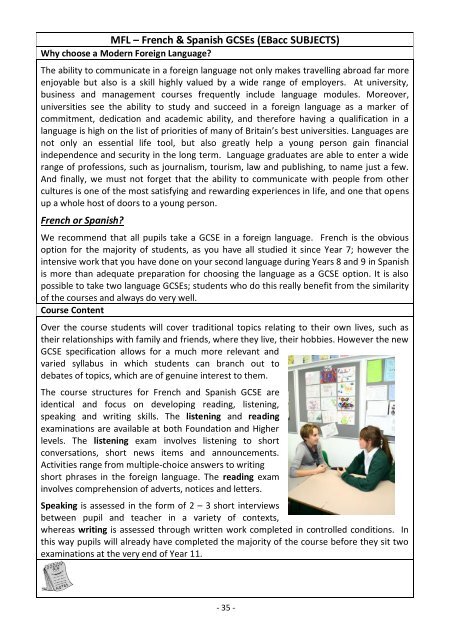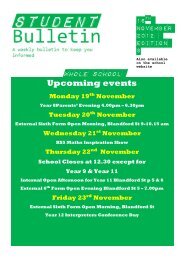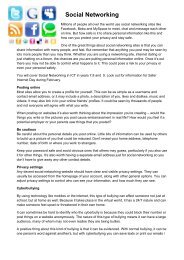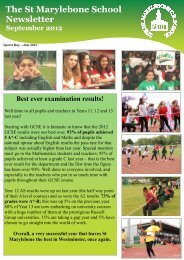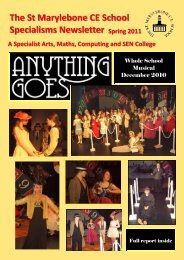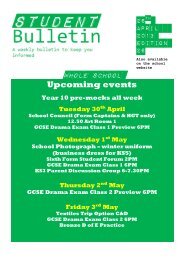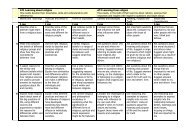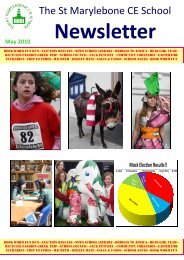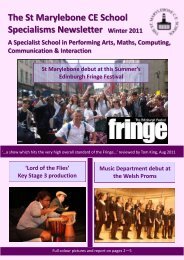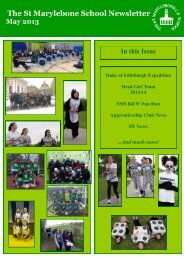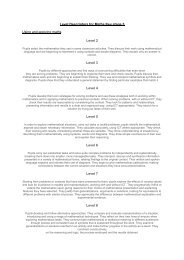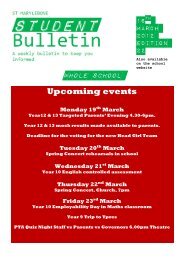Year 9 Options Booklet 2013 - St Marylebone School
Year 9 Options Booklet 2013 - St Marylebone School
Year 9 Options Booklet 2013 - St Marylebone School
Create successful ePaper yourself
Turn your PDF publications into a flip-book with our unique Google optimized e-Paper software.
MFL – French & Spanish GCSEs (EBacc SUBJECTS)<br />
Why choose a Modern Foreign Language?<br />
The ability to communicate in a foreign language not only makes travelling abroad far more<br />
enjoyable but also is a skill highly valued by a wide range of employers. At university,<br />
business and management courses frequently include language modules. Moreover,<br />
universities see the ability to study and succeed in a foreign language as a marker of<br />
commitment, dedication and academic ability, and therefore having a qualification in a<br />
language is high on the list of priorities of many of Britain’s best universities. Languages are<br />
not only an essential life tool, but also greatly help a young person gain financial<br />
independence and security in the long term. Language graduates are able to enter a wide<br />
range of professions, such as journalism, tourism, law and publishing, to name just a few.<br />
And finally, we must not forget that the ability to communicate with people from other<br />
cultures is one of the most satisfying and rewarding experiences in life, and one that opens<br />
up a whole host of doors to a young person.<br />
French or Spanish?<br />
We recommend that all pupils take a GCSE in a foreign language. French is the obvious<br />
option for the majority of students, as you have all studied it since <strong>Year</strong> 7; however the<br />
intensive work that you have done on your second language during <strong>Year</strong>s 8 and 9 in Spanish<br />
is more than adequate preparation for choosing the language as a GCSE option. It is also<br />
possible to take two language GCSEs; students who do this really benefit from the similarity<br />
of the courses and always do very well.<br />
Course Content<br />
Over the course students will cover traditional topics relating to their own lives, such as<br />
their relationships with family and friends, where they live, their hobbies. However the new<br />
GCSE specification allows for a much more relevant and<br />
varied syllabus in which students can branch out to<br />
debates of topics, which are of genuine interest to them.<br />
The course structures for French and Spanish GCSE are<br />
identical and focus on developing reading, listening,<br />
speaking and writing skills. The listening and reading<br />
examinations are available at both Foundation and Higher<br />
levels. The listening exam involves listening to short<br />
conversations, short news items and announcements.<br />
Activities range from multiple-choice answers to writing<br />
short phrases in the foreign language. The reading exam<br />
involves comprehension of adverts, notices and letters.<br />
Speaking is assessed in the form of 2 – 3 short interviews<br />
between pupil and teacher in a variety of contexts,<br />
whereas writing is assessed through written work completed in controlled conditions. In<br />
this way pupils will already have completed the majority of the course before they sit two<br />
examinations at the very end of <strong>Year</strong> 11.<br />
- 35 -


